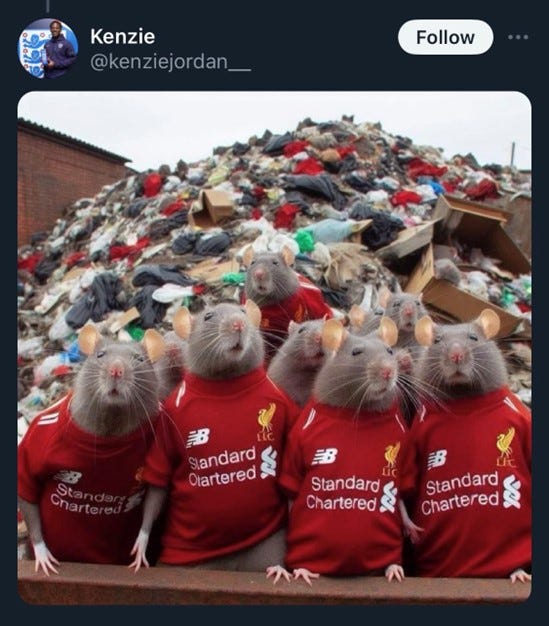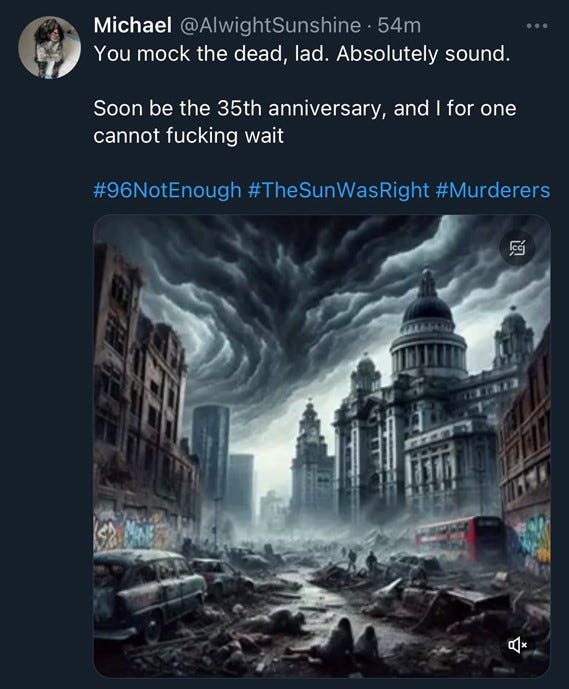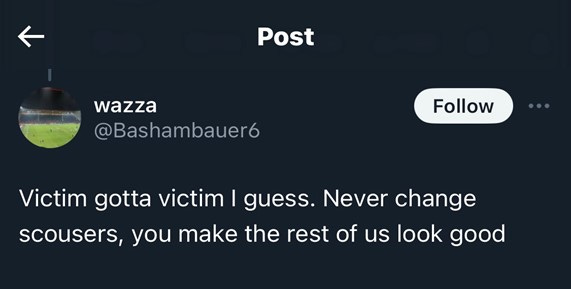This May, it was reported that less than 10% of people in the film and television industry are working class (Stephenson, 2024).
For most working-class people, this isn’t surprising. For fourteen years, The Jeremy Kyle Show saw the spectacle of low-income living broadcasted directly into homes across the country in an example of what has since been labelled ‘poverty porn’ - a trope certainly not of our own design, that now bleeds over into our comedies, dramas, thrillers, mysteries, and practically everything else. When it comes to sticking something on the telly at the end of the day, there are as many choices as streaming services you can afford, but who wants to see their own life played back to them through tragic, grey filters, and populated with actors who have never lived on this side of the poverty line? It’s not that upper-class people aren’t good writers, or that they don’t have the opportunities to write about working-class life - it’s just that they can never get it quite right.
In a series of tweets responding to the above statistic, The Responder writer Tony Schumacher drew attention to the avalanche of barriers facing working-class professionals - exacerbated not only by the lack of opportunities in the North itself, but also by the implicit classism within the industry. For Schumacher, it’s ‘almost impossible’ to get a gig if you ‘sound like me’ (Schumacher, 2024).
A little disheartening, if you are one of the few that happen to sound like Schumacher; currently consisting of hundreds of thousands of Scousers across the world, who can now see high-definition shots of their own streets and roads on demand, courtesy of BBC iPlayer. People, for Schumacher, are ‘disconnected from the arts’, because the arts are ‘disconnected from them’, with his Scouseness being not just a foundation for his writing, but also playing a part in the success of The Responder. People from Liverpool connect to it because the writer, or the actors, or the sound engineers sound ‘like them’ (Schumacher, 2024).
This isn't particularly surprising either. Northern creatives have faced criticism for their expressions of their identity as far back as the Victorian era, with dialect poets and regional writing becoming more prominent in locally published periodicals. For the first time, people were able to hear themselves in media, only to face backlash from the literary 'elite' in the capital for their differences, and 'unconventional' English. Wuthering Heights, now regarded as one of the greatest British books of all time, was labelled as 'vulgar' and 'coarse' for its depictions of life on the Yorkshire Moors, in a strand of criticism that would place the 'uncivilised' North against the intellectual and educated South (Mansfield, 2011). Dialectal studies and pronunciation guides urged members of society to eradicate their dreadful 'provincialisms' and take on 'proper English' - to lose the attributes of their communities and be absorbed into the proud, Great British masses (Crowley, 2013). For decades, accents have been inherently political; for every Victorian critic that found servant Joseph's use of Yorkshire dialect 'coarse' in Wuthering Heights, there are now hundreds of Twitter users claiming that the Scouse accents featured in The Responder are unintelligible - Lord Alan Sugar being among them (Bryant, 2022). There's no apparent effort given to try and understand or connect with these communities or characters, they are simply deemed as not worth the effort, because of how they sound.
Perhaps, as Schumacher writes, it is accent that prevents people from succeeding in the television industry, or even anywhere. In the nineties, one of the most prominent Scouse representations on television came in the form of a man from West Sussex, performing a pantomime of Scouse poverty in a curly wig and shell suit. Nowadays, social media is rife with anti-Scouse jabs and sentiment, with a recent post discussing the Hillsborough tragedy receiving replies featuring AI-generated rats in Liverpool kits, and tagged with


‘#96notenough’ (‘Kenzie’, 2024) (’Stiddaed’, 2024) (‘Michael’, 2024) (’wazza’, 2024.).
Even the newly-announced Beatles biopic, while not having a fully confirmed cast, is rumoured to star four already established, non-Scouse actors instead of native Liverpudlians - including one Barry Keoghan, who caught flak for his somewhat Scouse-adjacent accent in Saltburn last year (Singh, 2024). It's not that there aren't any Scouse creatives - Liverpool’s history as a televisual city runs as deep and wide as the Mersey with credits like Boys from the Blackstuff, The Liver Birds, Bread, Brookside, and many more. We saw the publication of one of the best-selling poetry anthologies of all time (Patten, et al. 1974), the formation of the biggest band in history, The Batman, Captain America - even Taylor Swift chose Anfield as the major Northern venue to host her record-breaking Eras Tour. In academic studies, Liverpool’s cinematic identity has been compared to that of the 'generic city' - a concept from Dutch architect Rem Koolhaas that acknowledges Liverpool's prowess in being able to adopt new identities or characters (Roberts, 2017). But, there is little to be said about the identities that already exist there. What does it say about Scouseness when the protagonist of Schumacher's authentic Liverpudlian triumph is played by a man from Hampshire with a net worth of millions? Or when the only actual Liverpudlians in the main cast of said triumph are playing drug lords, addicts, dealers, scallies, and henchmen? Or even when an animated chicken is named 'the best Scouse representation in years’ (Greasley, 2023)?
As it turns out, Scouseness is better suited to wools - whether that's because they're easier to understand, or because they can take the accent off with the rest of their costume and be 'normal', is unclear. Even G’Wed (Kenny, 2024), ITVX's entrant into this new era of Liverpudlian media, and meant to embody modern, working-class, teenage life in the city, was written by a thirty-eight-year-old from the Wirral, firmly removed from the Scouse youth of today. G’Wed, while attempting to portray life in poverty as something more than the common notion of Scousers sitting around on their arses and scrounging benefits (Hadfield, 2023), ended up connecting more with viewers who praised its criticisms of the 'woke generation' and 'pretentious progressivism', rather than the teenagers it was meant to serve in the first place (Kerr, 2024). But after the dust clears, and sets are broken down, the people of Liverpool are no better off than they were before.
This new image of Scouseness - removed from the kitchen sink and realist cinema of the eighties - is steeped in crime dramas and suffering, because that's what Scouseness is to outsiders. Combined with coverage of the dockers' strikes, the Hillsborough tragedy, Heysel, and the murder of Anthony Walker, the national perception of modern Liverpool functions in the shadows of what people presume Liverpool to be; gang violence, petulant unemployment, and a victimised mindset.
“[Liverpudlians] see themselves whenever possible as victims, and resent their victim status; yet at the same time they wallow in it. Part of this flawed psychological state is that they cannot accept that they might have made any contribution to their misfortunes, but seek rather to blame someone else for it.”
Boris Johnson on the Hillsborough Disaster, 2004
As John Belchem writes in Merseypride: Essays in Liverpool Exceptionalism, Liverpool functions outside of the 'main narrative framework' of the rest of the UK - an aspect crucial to its identity (Belchem, 2006). It differs in socio-economics, political leanings, speech, diet, culture; the product of Irish immigrants escaping the Great Famine, thousands of tradesmen, and a staunch opposition to conservative politics. It's through media, such as Boys from the Blackstuff, intentionally written to oppose Thatcherite conservative values in an era of labour strikes and widespread poverty (Brooker, 2020), that Liverpool became symbolic of not just the Scouse experience, but working-class life and anti-conservatism across the UK - with protagonist Yosser's 'gizza job' refrain becoming the basis for various chants at Anfield throughout the eighties . With anti-Scouse rhetoric being rooted in classism and anti-Celtic stereotypes that stretch as far back as the 19th Century, perhaps it's just that Liverpool separates itself from Britishness too much - too Irish, too socialist, too 'flawed' to be included in the idea of what a Brit should be. This line of thought is certainly supported by Liverpudlians, a great portion of whom identify themselves as 'Scouse, not English'.
For this, Scouse representations suffer. We are criminals, gang members, and drug addicts - from Stephen Graham's breakout role as racist thug Combo in Shane Meadows' This is England (Meadows, 2006), to a controversial ad for Ring doorbells, featuring a Scouse thief attempting to rob a London home (Southern, 2017). Our role in contemporary media has been decided; we must be the villains, until we reform ourselves completely. As an example, Belchem identifies Liverpool F.C's 2005 Champions League win in Istanbul as a metaphor for Liverpool's 'rehabilitation', with tabloids proclaiming that 'We're all Scousers now’, breakfast TV presenters rehashing Harry Enfield's Scouser skits, and the Times issuing an article concerned that success could 'damage [Liverpool's] self-image of put-upon miserablist isolationism' - despite the club's major success in the seventies and eighties (Belchem, 2006).
This miserablist isolationism is, in part, a product of outside perceptions of Liverpool, moulded by its history of difference, resistance, and resilience. Just as the Liverpool Poets were able to forsake the gang-based, suffering depictions of Liverpool for their own representations, grounded in human experience and enjoyment, the Scouse-studded set of The Responder provides an opportunity for Liverpudlians to redefine themselves how they want to be seen - albeit filtered through the perspectives (and faux-Scouse voices) of the principal cast.
While Freeman has been interviewed extensively about his performance of the Scouse accent, it is clear that it is more of a tool or skill than an authentic aspect of his identity. Scouseness, if performed poorly, would mean he would be 'taken to the cleaners' - 'you just can't be doing a bad Liverpool accent’ (Nisbet, 2022). Before I'd even sat down and watched a single scene, I'd already been bombarded with marketing materials and interview clips across social media debating Freeman's performance. It's not that Scouse was integral to Chris Carson's character; he wasn't written to be Liverpudlian, but it was Freeman who pushed for it, despite the threat of backlash, and failing to pass the Scouse 'test' that befalls many actors (Nisbet, 2022). Carson's identity, and the setting of Liverpool are thus important enough to warrant the use of accent, but not sufficient to cast a native Scouser, which would remove the debate of 'authenticity' entirely. Even advertising surrounding The Responder isn't just promoting the series in and of itself, but asking people to pass judgment on performances of an identity that isn't theirs, creating more conversation about the accuracy of Freeman's accent than the issues and themes at the show's core. Scouseness isn't necessarily platformed or championed, just a performance of it.
Whether it's a matter of casting a big name, or the perceived need to 'filter' Scouseness to make it more palatable to a wider audience, there is little to be said about the successes of Scouse identity that can be put on and taken off like a costume - particularly when Freeman's enjoyment of the Scouse dialect stems from being able to go to cafes without being recognised (Lally, 2022), and there is no one on his social media profiles calling for the deaths of more innocent Liverpudlians.
Despite the lack of working-class voices in television, and the lack of support for Northern art, Liverpool continues to thrive in its own unique sphere at the intersection of Merseybeat and modern scally-isms. Crosby-born Red Rum Club saw their newest album reach the top ten in the Official Charts, while ex-electrician Jamie Webster's '10 for the People' peaked at number two, and platforms such as TikTok allow us more access to Scouse voices than ever before. For Liverpudlians such as Tony Schumacher and myself, another working-class writer born and raised in the same borough (which, as of 2023, has earned the title of the second most deprived in England (Knowsley News, 2023)), it is clear that the empowerment of not only Scousers, but all working-class people, is essential for the future function of television - creating connections with audiences that are grounded in reality, rather than stereotype and separation.
About the Author
Erin Craine (ErinRCraine@gmail.com) is a Liverpudlian-Manx screenwriter and student currently studying an MA in Creative Writing and English Literary Studies at Lancaster University, where she specialises in television writing, and Northern regional identity. With her work being longlisted for the 2022 Plough Poetry Prize and featured in the regionally-focussed Celtic online journal Aimsir, her writing aims to bring more visibility to Northern media and communities.
References
Belchem, J. (2006). Merseypride: Essays in Liverpool Exceptionalism (NED-New edition, 1,1). Liverpool University Press.
Brooker, J. (2020). Not Winnin’ Anymore: Boys from the Blackstuff and the Literature of Recession. Crossings, 11, 40–53. https://doi.org/10.59817/cjes.v11i.68
Bryant, T. (2022, January 26) Lord Alan Sugar slammed for dissing Scouse accent in BBC drama The Responder; Apprentice star Lord Alan Sugar has been slammed for mocking the Liverpool accent as he claimed he couldn't understand a word what the leading stars of BBC's The Responder were saying. Daily Mirror. https://www.mirror.co.uk/tv/tv-news/lord-alan-sugar-slammed-dissing-26058678
Crowley, D. T. (2013). Language in History: Theories and Texts (1st edition.). Routledge. https://doi.org/10.4324/9780203416440
Greasley, R (2023, December 22) Netflix Chicken Run: Dawn of the Nugget character Frizzle named 'best Scouse representation in years’. Liverpool World. https://www.liverpoolworld.uk/news/new-chicken-run-character-named-best-scouse-representation-in-years-4455188
Hadfield, C (2023, May 14) Scouse comedy filmed across Liverpool coming to ITV. Liverpool Echo. https://www.liverpoolecho.co.uk/news/liverpool-news/scouse-comedy-filmed-across-liverpool-26908215
Johnson, B. (2004, October 16) Bigley’s fate. The Spectator. https://www.spectator.co.uk/article/bigley-s-fate/
‘Kenzie’, [@kenziejordan_, now @kjordan06_] (2024, April 8) [Image attached] [Tweet] X. Link Unavailable.
Kerr, D (2024, February) Some of the best comedy since the early 2010s, pokes fun at wokery and the pretentious progressivism we have to put up with in daily life! [Google Review] Google.
Knowsley News. (2023, October 18) The Public Health impact of the cost of living crisis. Knowsley News. https://www.knowsleynews.co.uk/the-public-health-impact-of-the-cost-of-living-crisis/
Lally, K. (2022, January 21) The Responder: Martin Freeman explains how he went 'undercover' in Liverpool. Liverpool Echo. https://www.liverpoolecho.co.uk/news/tv/responder-martin-freeman-explains-how-22807880#
Mansfield, J. (2011). The Critics, the Brontës and the North. Brontë Studies: The Journal of the Brontë Society, 36(2), 176–183. https://doi.org10.1179/147489311X12962076043444
‘Michael’, [@AlwightSunshine] (2024, April 8) You mock the dead, lad. Absolutely sound. Soon be the 35th anniversary, and I for one cannot fucking wait #96NotEnough #TheSunWasRight #Murderers [Tweet] X. https://x.com/alwightsunshine/status/1777382746475639088?s=46&t=WgWmUrcK4D4WYIGcENFmnw
Nisbet, M. (2022, January 25) BBC The Responder fans are all saying the same thing about Martin Freeman; Martin Freeman stars in the new Liverpool-based crime drama on BBC One. Wales Online. https://www.walesonline.co.uk/lifestyle/tv/bbc-responder-fans-saying-same-22862225
Patten, B., Henri, A., & McGough, R. (1974). Penguin Modern Poets 10: The Mersey Sound:Adrian Henri, Roger McGough, Brian Patten. (Revised and enlarged ed.). Penguin.
Roberts, L. (2017). Film, Mobility and Urban Space: A Cinematic Geography of Liverpool (NED-New edition, 1, 1). Liverpool University Press.
Schumacher, T [@tonyshoey]. (2024, May 15) Thread beginning: Been banging on about this for years. It's the last acceptable discrimination and it affects everyone of every gender, ethnicity… [Tweet] X. https://x.com/tonyshoey/status/1790669513379189136
Singh, S (2024, June 6) Sam Mendes’ Beatles biopics have reportedly cast the Fab Four. NME. https://www.nme.com/news/film/sam-mendes-beatles-biopics-have-reportedly-cast-the-fab-four-3763028
Southern, K. (2017, December 10) Burglar alarm ad sparks fury among Liverpudlians who ask why the man trying to break into London home has a Scouse accent. Daily Mail. https://www.dailymail.co.uk/news/article-5164995/Burglar-alarm-advert-sparks-fury
Stephenson, M. (2024, May 14). Working class creatives in film and TV at lowest level in decade. Channel 4. https://www.channel4.com/news/working-class-creatives-in-filmand-tv-at-lowest-level-in-decade
‘Stiddaed’, [@acceptedfinance] (2024, April 8) Dirty scouse rat [Tweet] X. https://x.com/acceptedfinance/status/1777348749993406473?s=46&t=WgWmUrcK4D4WYIGcENFmnw
‘wazza’, [@Bashambauer6] (2024, April 8) Victim gotta victim I guess. Never change scousers, you make the rest of us look good. [Tweet] X. https://x.com/bashambauer6/status/1777372860496941312?s=46&t=WgWmUrcK4D4WYIGcENFmnw





